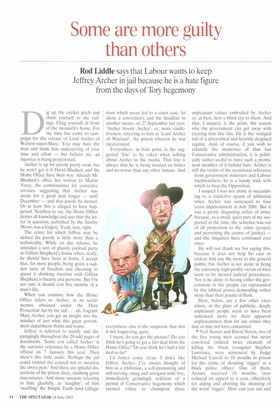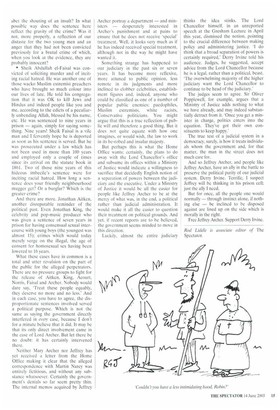Some are more guilty than others
Rod Liddle says that Labour wants to keep Jeffrey Archer in jail because he is a hate figure from the days of Tory hegemony
Dig up the cricket pitch and chain yourself to the railings. Fling yourself in front of the monarch's horse. For the time has come to campaign for the release of Lord Archer of Weston-super-Mare. You may hate the man and think him undeserving of your time and effort — but believe me, an injustice is being perpetrated.
Archer is up for parole pretty soon, but he won't get it if David Blunkett and the Home Office have their way. Already Mr Blunkett's office has written to Martin Narey, the commissioner for corrective services, suggesting that Archer stay inside for a good deal longer — until December — and that parole be denied. Or at least this is alleged to have happened. Needless to say, the Home Office denies all knowledge and says that the letter in question, published by the Sunday Mirror, was a forgery. Yeah, sure, right.
The crime for which Jeffrey may be denied his parole is little more than a technicality. While on day release, he attended a sort of ghastly cocktail party at Gillian Shepherd's house when, really, he should have been at home. I accept that, for most people, being given a sudden taste of freedom and choosing to spend it drinking martinis with Gillian Shepherd is bizarre and perverse. But I'm not sure it should cost five months of a man's life.
When you examine how the Home Office refers to Archer, in its secret memos obtained under the Data Protection Act by the still . . . uh, fragrant Mary Archer, you get an insight into the mindset of just what this great government department thinks and wants.
Jeffrey is referred to nastily and disparagingly throughout the 20-odd pages of documents. 'Some con called Archer' is the sarcastic reference by a Home Office official on 7 January this year. Then there's this little aside: 'Perhaps the jail could remind the council not to mention the above pest.' And there are spiteful dissections of his prison diary', claiming gross inaccuracies. And more sarcasm referring to him, gleefully, as 'naughty': of him 'snaffling' the Simple Truth fund (allega
tions which never led to a court case, let alone a conviction): and the headline to another memo, on 27 September last year, 'Archer bloody Archer': or, more vindictiveness, referring to him as 'Lord Archer of Wayland'. the prison wherein he was incarcerated.
Everywhere, in bold print, is the suggested 'line' to be taken when talking about Archer to the media. That line is always that he is being treated no better and no worse than any other inmate. And everywhere else is the suspicion that this is not happening, quite.
I mean, do you get the picture? Do you think he's going to get a fair deal from the Home Office? Do you think he's had a fair deal so far?
I'd better come clean. I don't like Jeffrey Archer. I've always thought of him as a philistine, a self-promoting and self-serving, smug and arrogant wide boy, immediately grinningly redolent of a period of Conservative hegemony which seemed either to champion those unpleasant values embodied by Archer or, at best, turn a blind eye to them, And that, I suspect, is the point, the reason why the government can get away with treating him like this. He is the vestigial tail of a discredited and heartily despised regime. And, of course, if you wish to rekindle the memories of that last Conservative administration, it is politically rather useful to have such a prominent member of it behind bars. Archer is still the victim of the occasional reference from government ministers and Labour backbenchers; he is a handy stick with which to beat the Opposition.
I suspect I was not alone in succumbing to a vindictive spasm of jubilation when Archer was sentenced to four years imprisonment in July 2001. But it was a pretty disgusting reflex of mine; because, as a small, quiet part of me suspected at the time, the sentence was out of all proportion to the crime (perjury and perverting the course of justice) — and the iniquities have continued ever since.
He will not thank me for saying this, because it does not help his case or endear him any the more to the general public, but Archer is not alone in being the extremely high-profile victim of what seem to be skewed judicial procedures. Nor is he alone in having either the government or the people (as represented by the tabloid press) demanding rather more than their pound of flesh.
Here, below, are a few other cases where, in the glare of publicity, deeply unpleasant people seem to have been sentenced more for their apparent unpleasantness than for any crimes they may or may not have committed.
• Neil Acourt and David Norris, two of the five young men accused but never convicted (indeed twice cleared) of killing the black youngster Stephen Lawrence, were sentenced by Judge Michael Carroll to 18 months in prison for the crime of shouting 'nigger' at a black police officer. One of them, Acourt, received 18 months, later reduced on appeal to a year, effectively for aiding and abetting the shouting of the word 'nigger'. How can you aid and abet the shouting of an insult? In what possible way does the sentence here reflect the gravity of the crime? Was it not, more properly, a reflection of our distaste for the two young men and an anger that they had not been convicted previously for a brutal crime of which, when you look at the evidence, they are probably innocent?
• Sheik Abdullah el-Faisal was convicted of soliciting murder and of inciting racial hatred. He was another one of those wacko Muslim extremist preachers who have brought so much colour into our lives of late. He told his congregation that it was OK to kill Jews and Hindus and indeed people like you and me, according to the edicts of a peculiarly unbending Allah, blessed be his name, etc. He was sentenced to nine years in prison — again, simply for saying something. Nine years! Sheik Faisal is a vile man and I fervently hope he is deported as soon as his sentence is served, But he was prosecuted under a law which has not been used in more than 100 years and employed only a couple of times since its arrival on the statute book in 1861. Two of those nine years of this hideous imbecile's sentence were for inciting racial hatred. How long a sentence does your friendly neighbourhood mugger get? Or a burglar? Which is the greater crime?
And there are more. Jonathan Aitken, another disreputable reminder of the political past. Even Jonathan King, the celebrity and pop-music producer who was given a sentence of seven years in prison for having consensual sexual intercourse with young boys (the youngest was almost 15); crimes which would today merely verge on the illegal, the age of consent for homosexual sex having been lowered to 16 years.
What these cases have in common is a total and utter revulsion on the part of the public for the alleged perpetrators. There are no pressure groups to fight for the release of Aitken, King, Acourt, Norris, Faisal and Archer. Nobody would dare say, 'Treat these people equably, they deserve no more and no less.' And in each case, you have to agree, the disproportionate sentences involved served a political purpose. Which is not the same as saying the government directly interfered in every case, because I don't for a minute believe that it did. It may be that its only direct involvement came in the case of Lord Archer. But let there be no doubt: it has certainly intervened there.
Neither Mary Archer nor Jeffrey has yet received a letter from the Home Office making it clear that the alleged correspondence with Martin Narey was entirely fictitious, and without any substance whatsoever. Certainly the government's denials so far seem pretty thin. The internal memos acquired by Jeffrey Archer portray a department — and ministers — desperately interested in Archer's punishment and at pains to ensure that he does not receive 'special' treatment. Well, it looks very much as if he has indeed received special treatment, although not in the way he might have wanted it.
Something strange has happened to our judiciary in the past six or seven years. It has become more reflexive, more attuned to public opinion, less remote in its judgments and more inclined to clobber celebrities, establishment figures and, indeed, anyone who could be classified as one of a number of popular public enemies: paedophiles, Muslim extremists, white racists, Conservative politicians, You might argue that this is a true reflection of public will and therefore a good thing. But it does not quite equate with how one imagines, or would wish, the law to work in its be-robed and insular majesty.
But perhaps this is what the Home Office wants; certainly, the plans to do away with the Lord Chancellor's office and subsume its offices within a Ministry of Justice would indicate a willingness to sacrifice that decidedly English notion of a separation of powers between the judiciary and the executive. Under a Ministry of Justice it would be all the easier for people like Jeffrey Archer to be at the mercy of what was, in the end, a political rather than judicial administration. It would make it all the easier to question their treatment on political grounds. And yet, if recent reports are to be believed, the government seems minded to move in this direction.
Luckily, almost the entire judiciary thinks the idea stinks. The Lord Chancellor himself, in an unreported speech at the Gresham Lecture in April this year, dismissed the notion, pointing to the crucial difference between making policy and administering justice. 'I do think that a broad separation of powers is certainly required,' Derry Irvine told his audience. Judges, he suggested, accept advice from the Lord Chancellor because he is a legal, rather than a political, beast. 'The overwhelming majority of the higher judiciary want the Lord Chancellor to continue to be head of the judiciary.'
The judges seem to agree. Sir Oliver Popplewell, for example, argues that a Ministry of Justice adds nothing to what we have already, and may indeed substantially detract from it. 'Once you get a minister in charge, politics enters into the equation. They've got their own constituents to keep happy.'
The true test of a judicial system in a democracy, surely, is how it treats individuals whom the government and, for that matter, the man in the street does not much care for.
And so Jeffrey Archer, and people like Jeffrey Archer, have an ally in the battle to preserve the political purity of our judicial system. Derry Irvine. Terrific, I suspect Jeffrey will be thinking in his prison cell; just the ally I need.
But for once, all the people one would normally — through instinct alone, if nothing else — be inclined to be disposed against are lined up on the side which is morally in the right.
Free Jeffrey Archer. Support Derry Irvine.
Rod Liddle is associate editor of The Spectator.



































































































 Previous page
Previous page